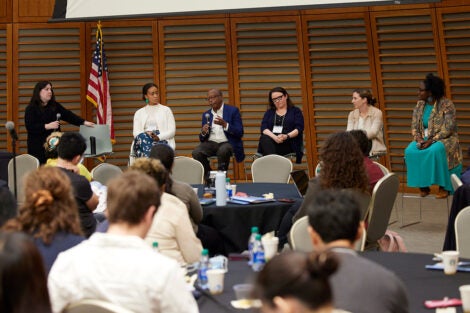October 26, 2023 – The field of genomics has the exciting potential to improve human health by using an individual’s DNA to predict disease risk, tailor treatments, and more—but because genomics studies to date have overwhelmingly included people with European ancestries, they could also exacerbate health inequities, according to experts at the 17th annual conference of the Program in Quantitative Genomics (PQG) at Harvard T.H. Chan School of Public Health.
Held October 17–18 at the Joseph B. Martin Conference Center, the event focused on the importance of diversity throughout all aspects of genetics and genomics research—such as studying diseases in underrepresented groups, improving data analysis for those groups, and holding transparent conversations with the broader public.
“We lack a lot of information in not just our genomic databases, but our entire pipeline into clinical care from research, in populations that are not Northwest European or Asian. And this has lots of knock-on effects as we start to bring genomic information into the clinic,” said keynote speaker Eimear Kenny, a professor of medicine and genetics and the founding director of the Institute for Genomic Health at the Icahn School of Medicine at Mount Sinai.
Diversifying the data pipeline
To help address the issue, Kenny conducts studies using the BioMe biobank in New York City, which prioritizes collecting data from individuals with diverse ancestry. In one study, she and her colleagues searched for genetic disorders that may be underdiagnosed due to a lack of data. They found a mutation in a collagen gene that was associated with Steel syndrome, which causes short stature and bone and joint problems—a disorder previously thought to be rare, but turned out to be relatively common in people with Puerto Rican ancestry.
“There are hundreds of individuals who would be walking around as adults with this disorder, according to our numbers in our health system. None of our individuals have ever had a record of having been diagnosed with syndrome,” Kenny said. She has since worked with clinicians to implement a molecular genetic test to screen for the disorder.
Kenny also highlighted the challenge of grouping people by ancestral backgrounds for genomics studies, since diseases are influenced by both biological factors and social determinants of health. “When we’re looking at appearance, we’re looking at something that’s a composite of genetic and non-genetic factors underlying disease,” she said.
The right terminology
Another keynote speaker was Vence Bonham Jr., acting deputy director of the National Human Genome Research Institute and an associate investigator in its Social and Behavioral Research Branch. He discussed the importance of using accurate terminology to describe groups when conducting genomics studies and communicating results—specifically, avoiding the incorrect term “race.”
Bonham and his colleagues studied how researchers’ use of different group terminology has evolved over time, analyzing the text of articles that have been published in the American Journal of Human Genetics in the last 70 years. They found that the use of the term “race” has decreased over time, while the use of “ancestry” and “ethnicity” have increased.
“Population labels are not based on an immutable biological order, but a shift in tandem with population terms that change with our society,” Bonham said.
Moving forward, he recommended that researchers pay attention to choosing the correct terminology depending on the type of study, since the words have different nuances. He also emphasized transparency in communicating study results with the media and the public, in order to avoid confusion or misinformation.
The conference also included a panel discussion that covered topics such as the biggest challenges facing the genomics field, along with potential solutions. Additionally, abstract awards were given to trainees with outstanding research projects.
“This year’s PQG conference marked a vibrant return to in-person gatherings,” said Xihong Lin, professor of biostatistics at Harvard Chan School and PQG co-director. “It was inspiring to witness dynamic speakers and highly engaged participants who contributed to lively discussions on addressing challenges and opportunities in advancing diversity in genetics research.”
– Jay Lau
Photo: Kent Dayton
